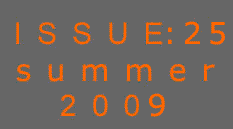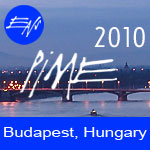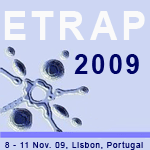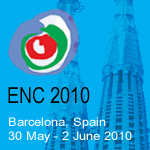

European Nuclear Young Generation Forum 2009
“Nothing is impossible”
The third European Nuclear Young Generation Forum (ENYGF 09) took place in Cordoba, Spain, from 19-23 May 2009. Under the banner headline: “Maybe we cannot build the future for us now, but we can build us for the future now”, the Spanish Young Generation organized this major event that is dedicated to young and senior nuclear professionals from across Europe. The location of the conference was the University of Cordoba, which has been recently renovated in the traditional Spanish architectural style, with Moorish influences.
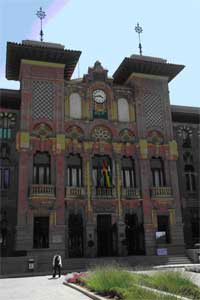
The focus of ENYGF09 was the provision of the training and education needed to prepare tomorrow’s nuclear leaders, and the creation of a communications bridge between the older and the younger generations in order to facilitate the transfer of knowledge.
Nowadays, nuclear energy is faced with three major challenges, according to Jose Emeterio Gutierrez, Chairman of the Spanish Nuclear Society: the revitalization of the industry, the transfer of knowledge and the safety of the present fleet of nuclear reactors. In order to face these challenges nuclear power must benefit from political and social consensus in the countries that want to develop a nuclear programme.
The Forum consisted of two days of conference sessions divided by a technical tour to the El Cabril radioactive waste repository. On 20 May, the conference brought to the attention of the public the necessity of having nuclear power and the major role that it will play in Europe’s energy future. The conference was opened with a series of keynote speeches given by David Bonser, Chairman of the European Nuclear Society, Jose Manuel Roldan from Cordoba University and Jose Emeterio Gutierrez. The keynote speakers pointed out the importance of having a common platform for nuclear power and renewable energy sources in order to gurantee Europe’s energy future.
The first plenary session, chaired by Luis Echavarri, Director General of the OCDE-NEA, was dedicated to a discussion of the role that stakeholders play in the deployment of nuclear energy in Europe. It included presentations from the main sponsors and promoters of ENYGF09, who shared their experiences and views on the issue.
Alejo Vidal-Quadras MEP (EPP-ED, Spain) and former Vice President of the European Parliament underlined the fact that energy is beneficial for everyone and can provide a solution to the problems of global warming, security of energy supply and European competitiveness. Nuclear energy ensures almost 16% of the current energy mix and, according to Tony Granda of AREVA, it is foreseen that by 2030 about 500 GWe will be generated by nuclear reactors.
The main conclusion of the first session was that for nuclear to have a bright future and increase its output the existing fleet of reactors must be safely operated, without any incidents.
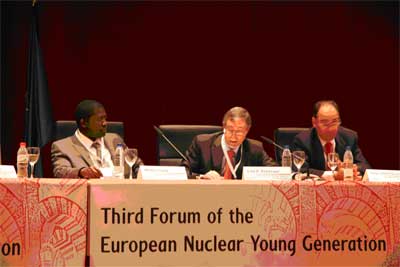
The afternoon session concentrated on the “drivers of nuclear energy acceptance” and the connection between public information and public acceptance. The papers presented by Fennovoima, SKB, FORATOM, SCK-CEN and the Spanish Young Generation pointed out that public perception of nuclear safety is influenced by nuclear plants’ safety track record and by the commitment that is shown to resolve the issue of nuclear waste. According to the presentation given by Berta Picamal of FORATOM, nuclear energy is a “back-of-the-mind” issue and this is the reason why public opinion on nuclear can be easily influenced.
The President of the Spanish Young Generation (SYG) gave a presentation about the hands-on activities that SYG has initiated to help gain greater public support for nuclear in Spain. Spain and Romania are the only two countries in the UE that have nuclear power stations and a low acceptance of nuclear power, with 24% and 35 % respectively. In order to gain the public’s trust it is important for Young Generation chapters to separate their interests from those of the nuclear companies. Also, information must be reliable, reader-friendly and address people’s concerns.
The day finished with a visit to the Cordoba Mosque and dinner in a winery to the accompaniment of flamenco music.
The following day the technical tour to the El Cabril low and intermediate level radioactive waste repository (a subsidiary of Enresa) took place. This repository receives approximately 2000 m3 of radioactive waste per year from Spain and can guarantee the safe storage of waste until 2020. After this date the site will be restored to its original state and protection will be provided for a further 300 years. The visit was followed by an equine demonstration and dinner at an oil mill that introduced participants to many aspects of Spanish culture.
The last day of conference was marked by the poster session that took place in the main hall and by the awarding of the Jan Runemark Award to a respected and successful promoter and supporter of Young Generation activities. I had the pleasure of taking to Mr. Marcel Maris while visiting the old city center in Cordoba, without knowing that he was about to receive the award. He gave me the impression of being a young and energetic man. The Jan Runemark Award was created by ENS’ Steering Committee in 1995 in memory of the founder of the Swedish Young Generation Network. This year’s winner, Marcel Maris, has given considerable support to the Belgian Young Generation during his time as Chairman of the Belgium Nuclear Society (2006-2007). Currently, he is leading the recruitment and training process for Bel V. The principles he developed and implemented during that time encouraged knowledge and competence and helped greatly to promote the transfer of knowledge between nuclear generations.
The plenary session entitled “Getting stronger: Crucial lessons” presented a number of cases studies in which challenging tasks were met resolved by the industry, including companies like CEZ, EDF and organizations like CEA and EPRI.
According to a presentation given by Franck Carre of CEA, the candidate reactor technologies that should consolidate the future of nuclear energy in Europe are the EPR (AREVA), the AP 1000 (Westinghouse) and the APWR (Mitsubishi). He also mentioned the sodium-cooled fast breeder reactors, of which there are 18 experimental prototypes.
Petr Stulc of CEZ stressed the advantage of nuclear energy’s price stability and how it is a key element in promoting this type of energy.
The final session was a debate on the ethics and physics of the linear non-threshold hypothesis, from the perspective of university professors. This theory was elaborated by Herman Muller to show that there is a threshold between the positive and negative impacts of radiation. Low-dose radiation stimulates the body’s protective mechanism, which contributes to the repair of damage and helps eliminate seriously damaged cells. The participants in this session concluded that with effective communications this hypothesis could help expose the myths about the effects of radiation.
A farewell dinner took place on the final day of the conference amidst the beautiful scenery of Almodovar Castle.
The following day we visited the Alhambra castle, a legacy of the Moors’ presence in Spain between the 7th and the 15th centuries.
On 24 May, a Core Meeting of ENS Young Generation took place during which participants elected the new Chairman in the person of Edouard Hourcade, from CEA (France), as well as the new Vice-Chairman – Andrei Goicea from SN Nuclearelectrica SA (Romania).
In my opinion, the European Nuclear Young Generation Forum 2009 was a professional and social success due to the exchange of information that took place between the young generation and the older generation, the focus on communication strategies applied by different companies and the networking possibilities the forum offered during the social events.
And finally, it would be unfair not to mention the Cordoba Fair, which took place during the Forum and gave us a glimpse of the Spanish way of life, its energy and enthusiasm.
Rizea Lavinia Sandra
SN Nuclearelectrica SA (Romania) |

